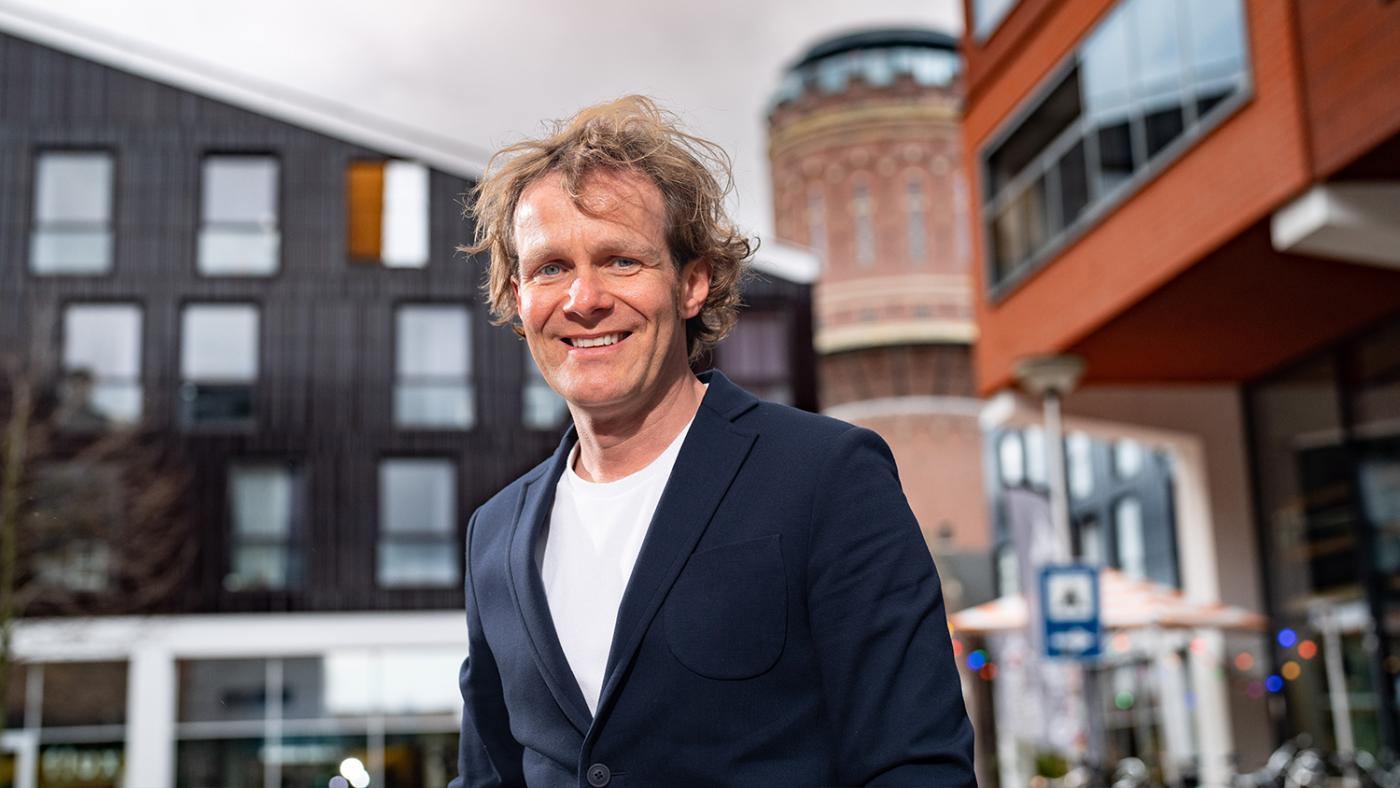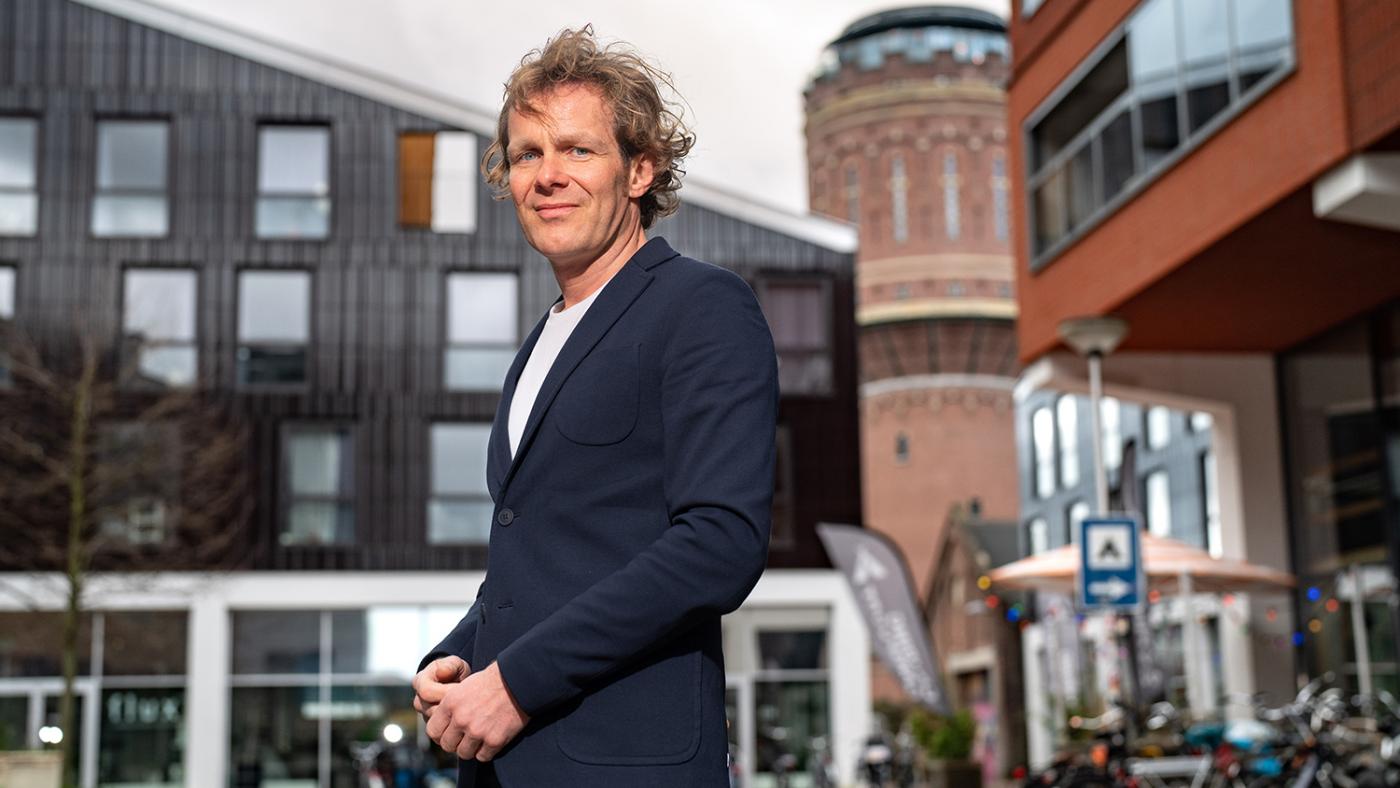A conversation with national student housing director Ardin Mourik
Rooms in Bunnik or Nieuwegein can alleviate housing pressure in Utrecht

DUB meets Mourik in a café in Rotsoord, a former industrial site right behind Vaartsche Rijn station that is now home to several cafés and restaurants, housing complexes and a concert hall. A significant transformation. “This used to be a really messy area,” he reminisces, attributing its current set-up to the arrival of student housing. “This is a really interesting product that can inspire other cities looking to develop messy areas.” One of its advantages is that it can accommodate lots of people: students usually don’t have a car, which makes parking spots unnecessary. “If you see how many people are living in such a small space and compare it to your regular residential area, the revenue is obviously much bigger.”
It's clear that Mourik is an advocate for student housing in the Netherlands. In December, he was appointed to the role of student housing director, a position in which he is assigned by the government to ensure that 60,000 additional student homes will be built by 2030. Last year, the Dutch government, educational institutions and student housing providers signed an agreement best known as the National Action Plan (document in Dutch, Ed.). In Utrecht, the shortage is so dire that students have to wait an average of three years for an SSH room. An agreement has been made to provide 4,200 to 5,800 additional houses by 2030. To honour it, Mourik has been in touch with all the parties involved.
Mourik studied in Utrecht himself: he followed the Geography teaching programme at the Utrecht University of Applied Sciences, followed by Theology at UU. The first room he ever occupied was at Smaragdplein. "I think I lived there for three or four years. It was a privately-owned apartment. Eventually, enough time had passed since I'd first registered at SSH, but I had such a nice house by then that I didn't think it was worth the move, even though I was paying way too much." Mourik ended up challenging his rent and the rent committee ruled in his favour. As a result, however, he was not on good terms with his landlord. "The vulnerable position tenants are in has always stayed with me," he says. But that wasn't the only thing that stayed with him: he also learned the importance a student room could have in someone's life. "I come from a very solid, Christian environment, in which it’s not common to go and live in lodgings. After I did that, I came out of the closet in three months." He thinks those two things are related. "I wish everyone a very nice dorm, for their own self-development."
An unforeseen wave of international students
His own housing experience "ignited" him to work with the topic. After working in the education sector for a while, he was appointed director at Kences, a knowledge centre for student housing, in 2015. DUB spoke with him about the appointment at the time, which coincided with the introduction of the current loan system (article in Dutch only, Ed.). As a result, fewer students were expected to move out of their parents' houses. "We need to take a good look whether all these new buildings still fit a scenario in which more students will be living with their parents," Mourik stated back then.
That scenario has made a complete U-turn. At the time, 347,000 students were expected not to be living with their parents but this figure jumped to no less than 409,200 in 2022 — an increase of 14 percent in eight years. This has been caused by something that wasn’t foreseen in 2015: a significant increase in the number of international students. “They all need a home since they don't have parents to live with. That creates a huge pressure on the market," he explains. Most international students in the Netherlands come from other countries in the European Union and European Economic Area, which means they cannot be turned down due to European law. One of the solutions proposed is reducing the offer of English-taught courses. "But that would be a very drastic measure," Mourik ponders.

Surrounding areas
Another idea would be to "build more homes like a mad person.” To do that, Mourik believes one would have to look beyond Utrecht. “I see university cities struggling to solve the housing problem within the city’s boundaries. That’s where you have to start but, at a certain point, you'll hit a wall.” In his view, we need to spread out to surrounding areas in time, especially for the sake of internationals. “For a Chinese student, Bunnik is basically part of Utrecht. Students in China sometimes travel for an hour and a half by train just to get to university." According to him, some municipalities are already open to the idea but this would have to be organised by a professional housing organisation, on a relatively large scale. "You need a certain mass to make sure a property can be managed neatly and that there’s a bit of a buzz among students."
But what do international students think of this plan? It’s common knowledge that they have a harder time scoring a room and, when they do, they pay more rent. Sofie (19) studies Economics and has been living in the city centre since December. Before that, she was staying at a hotel because she didn't have a room. “It was extremely hard to find a room.” Edoardo Menoncin (25), a Financial Management student, also spent his first twenty days in Utrecht in a hotel and an Airbnb apartment. He managed to find a room on Voorstraat but he is paying a lot for it. He wouldn't mind living outside of Utrecht. “As long as I spend less than an hour on my commute,” adds his friend Nicolas Stavrides (23). “It’s better than a hotel,” Sofie underscores.
Elsa van den Brink (22) studies Social Geography and Planning at UU and has been living in Nieuwegein for four years. She enjoys living there but considers the distance a downside. Hitting the town spontaneously is not an option for her, as is traveling back by public transport at night. Celine Sanders (21), who studies Chemistry and lives in Bunnik, can relate. She can get to the Utrecht Science Park, where she often has classes, by bike in 15 minutes but the city centre is twice as far. “Besides, cycling back alone late at night isn’t pleasant,” she adds. Since the Covid lockdown, night buses are no longer running and they will not be making a comeback anytime soon due to a shortage of staff (news article in Dutch, Ed.).
Mourik acknowledges this problem. He considers an appropriate offer of public transport to be an important prerequisite for student housing in outlying areas. “That really has to be well-arranged. Unfortunately, it’s a fact that many provinces are cutting back on public transport,” he laments. That's why he's been in talks with the province of Utrecht. Asked whether he thinks most students would be interested in a room outside Utrecht, he says: ”We know that distance is an issue. But we won't make it otherwise. In the long term, it’s either living with your parents or living a bit further away from the university.”